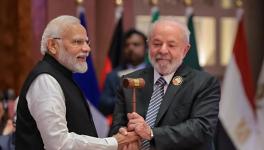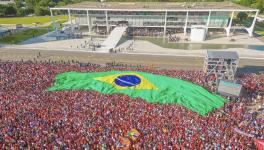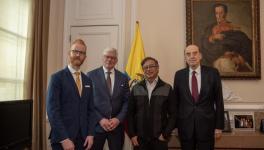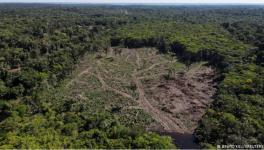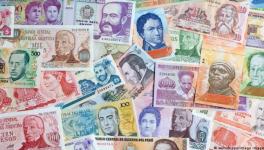NETmundial or the Internet Governance World Cup?
NETmundial – a global conference on Internet governance – was held last week in Sao Paulo (April 23-24) and ended with a non-binding outcome statement that was weak on surveillance and with some gains for big business. Big business managed to smuggle in some measures to help them on intellectual property and managed to bury net neutrality, a major issue for Internet users, into a future action section. The Russian and Cuban delegations disassociated themselves from the outcome, while the Indian delegation stated its inability to endorse the outcome, as they did not have such a mandate. While the outcome document was clearly a compromise on many counts, the worrying part was the attempt by the US and its allies of trying to set up a new model of decision making on international issues – called the “multistakeholder model” – that centre stages big business. Though this did not succeed, with the outcome document having enough ambiguity on this count, an opening has been created for a further assault on the nation states and the UN system.
The backdrop to the NETmundial organised by Brazil was President Dilma Roussef's speech in the UN General Assembly in September last year, where she sharply criticised the US and its allies for mass surveillance and violations of sovereignty of other countries. In her speech, she had also declared that the control of the Internet by one country – the US – as unacceptable and called for a multilateral governance of the Internet instead.
Though the Internet has emerged as an essential tool for mass communication today, its governance is controlled by ICANN, a US non-profit corporation under a contract (called the IANA functions contract) from the US Department of Commerce. ICANN allocates the domain names and IP addresses (these are like telephone numbers and help identify all the computers on the Internet) to what are called domain registrars who in turn sell it in the market. Apart from the vital importance of the Domain Name System (DNS) in today's Internet mediated world, domain names and IP addresses are also valuable “real estate”. Just the .com domain – a global Top Level Domain (g-TLD) – nets more than a billion dollars in revenue for Verisign, its domain registrar. Any time anybody buys a domain that has a suffix .com, Verisign gets a cut. Today, ICANN has an annual income of more than 400 million dollars, largely derived from its property rights over the g-TLD's on the Internet.
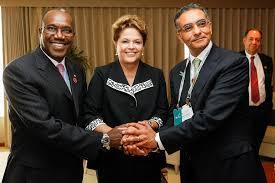
Image Courtesy: flickr.com
The control over the DNS space, the IP addresses and the technical protocols that make the Internet run are under ICANN and a set of technical bodies, all located in the US. The key Internet technical organisations are largely peopled by the US global corporations such as AT&T, CISCO, Google, Microsoft, Yahoo, etc., who are also NSA's partners in the global surveillance state.
The control of the US over ICANN is exercised in three different ways. One is simply that ICANN is a contractor to the US government. It understands this completely and falls in line whenever the US government cracks the whip. The second is that it asserts influence over the Internet organisations through back-room manoeuvres; this is the way the NSA weakened the encryption standards and put the entire global financial system at risk. The third is by virtue of all these organisations being located in the US (and this was done as design and did not happen accidentally), they come under the US laws.
Post Snowden revelations, the US has lost an enormous amount of credibility. Dilma's call for a true international structure for the Internet was obviously bound to get traction in a world increasingly dependent on the Internet and wary of the US.
The US response was two-fold. One was to let the key Internet organisations including ICANN approach Dilma to be a co-organiser of the meeting. Fadi Chehade, the ICANN CEO met with President Dilma after her UN speech and managed to have ICANN become a partner with Brazil in the conference. For this purpose, ICANN set up an umbrella organisation called 1Net which partnered the Brazilian Internet Steering Committee – CGI,br – in organising NETmundial. It allowed ICANN to become a part of the core organising team of NETmundial through 1Net and therefore playing a key role in the outcome document.
The second step that the US took was to offer to relinquish its supervision of ICANN by 2015 – the IANA function contract -- provided the world agrees to have a “multistakeholder model” without governmental control of Internet governance. In effect, the US was asking for the Internet to be handed over to ICANN and the US corporations; this was its price for giving up its formal control.
Even after giving up its formal control, ICANN would be under the US legal jurisdiction. So if sanctions are imposed on Iran, it is possible for the US to still take .ir – Iran's country Top Level Domain (cc-TLD) out of the DNS space. The consequences for Iran would be much more damaging, even more than being “expelled” from the SWIFT banking system due to the US sanctions. Under conditions of war or an international confrontation, such power resting in the US hands is an obvious threat to many countries.
While the mass surveillance and the blatant violations of sovereignty were the key issues for Brazil, for the US and ICANN, it was establishing a new multistakeholder model. In this model, big business would sit along with the governments on equal footing to determine policies. This would ensure that the Internet would be run by big business and without any regulatory oversight by the states. That this is a neoliberal version of governance in the international arena is obvious.
On both these sets of issues, the outcome document is a compromise. On the multistakeholder model, the 27-member High Level Committee – set up by Brazil that included 12 governments, 12 members from the other stakeholders (3 each from business, civil society, technical community, and academia) and 3 from international organisations, presented a draft that virtually endorsed “the equal footing multistakeholder model”. The World Summit of Information Society (WSIS) declaration of 2005 known as the Tunis Agenda and its formulation of “stakeholders in their respective roles and responsibilities” was missing in the draft.
In the inaugural of NETmundial, President Dilma repeated the issues she had raised in the UN General assembly last year. She also called for a dialogue between the multilateral and the multistakeholder processes Interestingly, Ambassador Bernardo Silvia, who was the key figure from the side of the Brazilian government, made clear in his intervention at the NETmundial that Brazil considered the Tunis Agenda to be very much alive and did not see NETmundial as its replacement. A number of governments and some members of the civil society argued that a multistakeholder model of Internet governance as proposed leaves out the role of the states in protecting its citizens and asked for the explicit mention of the roles and responsibilities of the stakeholders as per the Tunis Agenda.
The original draft also had no mention of mass surveillance, left out the issue of cyber war raised by President Dilma in the UN and was silent about net neutrality. Net neutrality has become important as without it, Internet Service Providers (ISP's) can provide different quality of service for different kinds of content; an Internet, where the 8-lane, fast highways are left for the exclusive use of Google, Facebook and other such Internet giants, while the rest make do with slow backroads. Brazil has recently passed Marco Civil – an Internet Bill of Rights for its citizens – which has net neutrality as an important element. European Parliament has recently passed legislation protecting net neutrality. The Federal Communications Commission (FCC) is also trying to produce measures for net neutrality in the US. TRAI in India is also seized of the matter.
The fight back on both these counts – the business driven multistakeholder model – and bringing back issues of concern to global citizens was only partially successful. The Tunis Agenda with roles and responsibilities of respective stakeholders is now one of the principles, though with the rider of an evolving roles and responsibilities. The states are now accepted as being responsible for protecting citizens rights. Mass surveillance is there in the final outcome document, but in a form that does not condemn outright the practice of mass surveillance as a violation of the human right to privacy and also does not mention the “necessary and proportionate” principle for conducting surveillance by governments. Cyber weapons and cyber peace does not find any mention in the outcome document, in spite of Dilma's call.
Big business not only was able to bury net neutrality successfully, it also incorporated two statements that strengthen intellectual property on the Internet. The right to share and communicate has now been circumscribed by the rights of “authors and creators”, an obvious attempt not only to introduce copyright law into human rights, but also expanding such rights by adding something called creators to authors, a term that has no standing even in copyright law. Secondly, a provision has been introduced under intermediary liability (protecting intermediaries from liability for violations of copyright or other laws by their users) to pitch for a collusion between content providers and intermediaries for protecting copyrights.
More than what the document contained, the process followed – a supposedly multistakeholder process – showed up its weakness. The “representatives” of each of the stakeholder were hand-picked by 1Net (in effect ICANN and a narrow coterie surrounding it), the drafting was done by a group that while open for people to observe, was clearly manipulated by big business; some members of the civil society entered into unhappy compromises with big business, in this case Disney Corporation and gave away concessions that they had no right to offer. In short, all the problems of a multistakeholder process, in which stakeholder representatives are hand picked by big business, the procedures that allow for informal exercise of power and arbitrary decision making, was there for all to see.
Some have compared NETmundial to the football world cup. So did big business and the US win the Internet governance world cup? I do not believe so. At the end, I would still call it a draw. Big business has gained traction in Internet governance with the help of the US and certain sections of civil society, but the game is not over yet.
What was unfortunate in NETmundial was the complete disarray of the global south countries. Neither G77 nor IBSA/BRICS had a game plan. Even Brazil and India had no co-ordination among themselves. For me, this was the most disquieting element in NETmundial.
Disclaimer: The views expressed here are the author's personal views, and do not necessarily represent the views of Newsclick
Get the latest reports & analysis with people's perspective on Protests, movements & deep analytical videos, discussions of the current affairs in your Telegram app. Subscribe to NewsClick's Telegram channel & get Real-Time updates on stories, as they get published on our website.











